

As Tesla works to ramp up production of the Model 3, a new report claims the current pace of production is already negatively affecting quality. Reuters reports that more than 90 percent of Model S and Model X electric cars roll off the assembly line with some kind of defect that needs to be addressed before they can be delivered to customers.
Reuters said the figure is based on data from Tesla’s internal tracking system, supplied by Tesla employees who spoke on the condition of anonymity. But Tesla disputes the report. While the company would not provide specific figures to Reuters or The Drive, it attributed the employee claims to an unusually-stringent inspection process that flags even the tiniest anomalies.
Defects and other issues are impossible to avoid, especially when launching a new model. But the current and former Tesla employees interviewed by Reuters painted a picture of a production process where speed trumps quality. One person described defects including doors not closing, missing parts, loose objects, and water leaks. He wondered how, despite having built the Model S since 2012, Tesla is still having problems with water leaks.
Other employees told of pressure to keep the assembly line moving, even when parts weren’t available. Cars were sent down the line missing major components like windshields and bumpers with the understanding that they would be added later, the employees said.
Reuters interview nine current and former Tesla employees, including a former senior manager, with quality-control experience. All spoke on the condition of anonymity because they had signed non-disclosure agreements. Four of the people were fired for cause, including two last month in a mass termination Tesla said was due to poor performance. The fired workers interviewed by Reuters denied they were poor performers.
Minor defects such as scratches and dents are fixed on the factory floor, employees said. But they also described outdoor “yards” where as many as 2,000 cars have queue up for more complex repairs. Tesla denied these “repair yards” exist. It said most post-assembly fixes are incredibly minor and take just minutes to address.
“Our goal is to produce perfect cars for every customer,” a Tesla spokesperson said. “Therefore, we review every vehicle for even the smallest refinement. Most customers would never notice the work that is done post-production, but we care about even a fraction of a millimeter body gap difference or a slight paint gloss texture. We then feed these improvements back to production in a pursuit of perfection.”
Tesla believes the 90-percent defect rate quoted by Reuters is misleading because most post-assembly work involves very minor repairs, or prep work that can’t be done on the assembly line, such as wheel alignments. Only cars with absolutely no issues are cleared for delivery to customers on the first pass, the company noted, denying that large numbers of cars are held back because of major problems.
The automaker also noted that it still has the “highest customer satisfaction levels and the highest percentage of customers who say that their next car will be a Tesla in the entire global auto industry.” It’s true that in the last Consumer Reports customer satisfaction survey, 91 percent of owners said they would buy another Tesla. But some customers, especially ones as loyal as Tesla’s tend to be, are often willing to overlook build-quality issues if they like their cars for other reasons. The expansion of the customer base brought on by the Model 3 means Tesla can no longer count on that, so build quality will be more important than ever going forward.